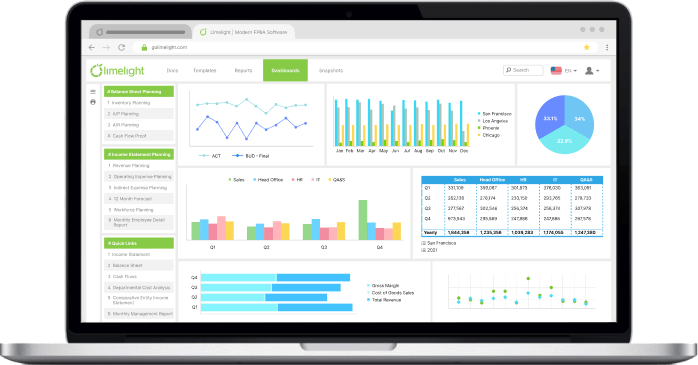Do you wish there was a better and faster way to report financials?
Finance departments are burdened with mountains of unformatted data, spreadsheets in inboxes, disparate systems, and tight deadlines when it comes to producing financial reports to key stakeholders.
As a leader in finance, you need to create a strategy that allows your staff to work efficiently and collaboratively with all the right data, tools, and people, contributing to the company’s financial health.
Improving your financial reporting can help prevent delays, mistakes, and costly expenses. Having accurate and timely financial report packages can help your organization understand its financial position, identify issues impacting your profitability, and uncover new opportunities for expansion. It can be overwhelming for your team to even start to make any type of process improvement.
So, where should you begin in your journey to improve your financial reporting?
In this article, we'll give a brief description of financial reporting. Read on to learn its definition and steps to improve your processes.
What Is Financial Reporting?
Financial reporting is a collection of your finances to track your organization’s health and performance. A standard financial report package includes the income statement, balance sheet, and cash flow statement. However, you may have to produce more frequent and tailored reports to many internal and external stakeholders as you grow your business.
Producing coherent financial reports is critically important for evaluating your operations, examining cash flow, showing financial conditions to investors, paying taxes, business planning, and growth forecasting.
With a proper system, you get improved decision-making in relation to your finances. It makes it easier to track your revenue, expenses, profit, and liabilities. Find new ways to effectively plan your budget, make predictions based on accurate data, and take advantage of new opportunities that await.
Steps to Improving Your Financial Reporting Process
What should you do to address the challenges of producing financial reports?
Outdated processes can’t keep up because of constant changes in the modern world. With business operations and policies migrating to digital, there is a higher need for data security, user access, system controls, and protection from cyber attacks. Updating your financial reporting process is more than just a change in task management, but an upgrade in best practices as you adapt to the new norm.
Below are 5 steps that can immediately improve your financial reporting processes.
1. Identify Time-Consuming Steps in the Reporting Process
It's best to know your areas of improvement. A good place to start is documenting your reporting requirements and processes. This gives you a better understanding of where your team is spending most of their time and identifies where manual interventions could be automated.
Many tasks in the Office of Finance have varying paces of completion, not to mention data access and skill set requirements. As a mid to large-sized organization, many tasks can take longer without having a better system. This includes tasks like consolidations, data entry, and manipulation.
Be sure to check your transactions’ complexity and volume to apply a better practice. For example, your team may spend a lot of time with spreadsheet formatting. To have a more efficient process, give them a financial report template.
2. Standardize and Look for Ways to Improve Internal Workflows
Standardization is critical when managing your financial reporting process. It ensures all team members use the same data source, calculations, formatting, and templates to produce all your financial reports. This guiding principle alone can save your teams from many late nights and multiple revisions due to errors or inconsistencies.
Without standardization, only certain people in your organization can perform specific functions. The knowledge required to finish complex reporting tasks often gets fragmented because emails, notes, or verbal communication can get lost in translation.
Standardize the redundant administrative processes. This equips your team with the base knowledge and time needed to finish more important financial reporting tasks. It also simplifies training and onboarding as well.
To ensure a more integrated report, your company must have standardized submission deadlines. It ensures that every team member will have the right information on hand, on time. Missing or late information can have a huge ripple effect in the production of timely financial reports.
3. Automate Repetitive Tasks and Frequent Requests
Every department in your organization is likely already using the latest cloud technologies. So, why is the Office of Finance an exception? There are many tools that allow you to automate certain repetitive tasks.
These tools enable your team to finish their financial reporting quickly and efficiently. Financial automation tools also help you upgrade from using outdated spreadsheet programs and old methodologies. Using automation can immediately save your company hundreds of labor hours.
Automation also reduces the risk of running into errors and inconsistencies. Even with an experienced team, the risk of human errors in data entries is still common and can throw off your financial reports. As a result, the wrong numbers can cause a negative domino effect in decision-making.
Investing in any automated system will help lessen human errors. However, it’s wise to search for the best financial reporting, analysis, and performance management software that addresses your needs. There are many to choose from, so take your time and evaluate each carefully.
4. Consider Centralizing Data, Tools, and People in a Collaborative Platform
A central data system may sound complicated and expensive at first. However, not having one is likely costing you countless hours dealing with various source systems, security risks, and lost productivity. Pulling information can become a nightmare if you have no centralized data system or workspace.
If you’re creating new spreadsheets to track every bit of financial data, you’ll quickly realize that you’re contributing to an unmanageable system. Pulling information separately and manually takes hours. A single source allows teams to gather data efficiently and produce reports with more control and accuracy.
Collecting spreadsheets from every department means less time to work on more important projects. Ideally, department leaders would have access to a central workspace where they can submit their reports and visualize their data gaps and outliers. This allows the finance department to spend less time on administrative work and more time on strategic projects.
5. Develop a Strategy to Empower Other Leaders to Make Data-Informed Decisions
Developing a better strategy for your financial reports should include having access to the right data, at the right time, using the right tools. Producing financial reports will always be a requirement, however, having the ability to expand details and perform quick analysis is something that all leaders want.
Build a data-driven culture for decision-making. With data-driven thinking, not only will your leaders and managers feel connected to their performance and expense metrics, but they will also have more confidence in the financial reports being distributed.
For managers, empower your team members with data access and inputs. Involve them in the process, and they will trust the metrics and your decisions.
The Future of Your Financial Reports
A clear financial reporting strategy that works with both you and your team is a massive competitive advantage. By implementing these 5 steps, you can improve, standardize, and collaborate better throughout your entire financial reporting process. Timely and accurate financial reporting is essential to effectively manage your company's financial health and performance.
You don’t have to be alone in this journey. We can walk you through improving your systems and processes together. Contact us today to get started with automating your financial reports.






